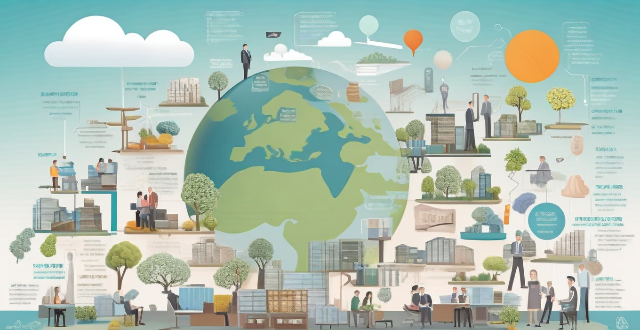Change Responsibility

How are climate change and investor responsibility interconnected ?
Climate change and investor responsibility are interconnected in several ways. As investors, it is important to consider the impact of our investments on the environment and society as a whole. Here are some key points that highlight the interconnection between climate change and investor responsibility: 1. Environmental Impact of Investments 2. Risk Management 3. ESG Criteria 4. Regulatory Changes 5. Shareholder Activism 6. Reputational Risk

How do ESG standards affect corporate responsibility ?
ESG standards shape corporate responsibility by providing a framework for measuring and managing company impact on the environment, society, and governance. They require companies to reduce their carbon footprint, ensure sustainable sourcing, promote diversity and inclusion, engage with communities, maintain ethical business practices, and encourage board diversity. Adhering to these standards demonstrates commitment to sustainability and social responsibility, leading to long-term success and profitability.

How does corporate social responsibility impact employee satisfaction and retention ?
Corporate Social Responsibility (CSR) is a business model that focuses on balancing profitability with social responsibility. It involves companies taking actions to improve societal well-being, environmental sustainability, and ethical practices. This approach not only benefits the community and the environment but also has a significant impact on employee satisfaction and retention. The relationship between CSR and employee satisfaction includes enhanced company image and reputation, alignment with personal values, and improved work environment. The relationship between CSR and employee retention includes lower turnover rates, increased loyalty, and higher engagement levels. In conclusion, corporate social responsibility plays a crucial role in enhancing employee satisfaction and retention. By prioritizing CSR initiatives, companies can create a positive work environment, attract and retain talent, and foster loyalty among their employees. As a result, businesses that embrace CSR are more likely to have a stable workforce and achieve long-term success.

What is climate debt ?
Climate debt is a concept that suggests wealthy nations owe a moral and ecological debt to poorer countries due to their disproportionate contribution to global warming. The idea is based on the principle of "common but differentiated responsibilities," which recognizes that all countries have a responsibility to address climate change, but the extent of this responsibility should be based on historical contributions and capacity to take action. Key points include historical responsibility, capacity to mitigate, and vulnerability and adaptation. Wealthy nations have been industrializing for longer and have more resources to invest in renewable energy, while poorer countries often lack the financial and institutional capacity to adapt to the impacts of climate change. Addressing climate debt is seen as an essential component of any equitable and effective response to the urgent challenge of climate change.

What are the ethical implications of climate refugees and displacement ?
Climate change has led to the displacement of people, creating a new category of refugees known as "climate refugees." The ethical implications of this issue involve the right to life and security, respect for human dignity, responsibility and accountability, international cooperation, and sustainable development. It is essential to ensure that climate refugees have access to basic necessities like food, water, shelter, and healthcare, and treat them with compassion and empathy. Governments, corporations, and individuals must take responsibility for their actions and work towards mitigating the effects of climate change. International cooperation is necessary to develop policies and strategies that protect the rights of climate refugees and prevent further displacement. Sustainable development is also crucial in minimizing the impact of climate change on future generations and avoiding further displacement. Addressing these challenges requires collective action from all sectors of society.

How can companies effectively incorporate climate change considerations into their corporate social responsibility (CSR) strategies ?
Incorporating climate change considerations into corporate social responsibility (CSR) strategies is crucial for companies to mitigate the impact of climate change and enhance their reputation and sustainability. Key areas of focus include sustainable sourcing, energy efficiency, waste reduction and recycling, transportation and logistics, and employee engagement and education. By prioritizing these areas, companies can demonstrate their commitment to addressing climate change and contribute to a more sustainable future.

How do climate change lawsuits against corporations influence environmental policy ?
Climate change lawsuits against corporations are a tool in the fight against environmental degradation. They raise awareness, force corporate responsibility, influence government policies, promote sustainable practices, and encourage legal action. These lawsuits contribute to a more sustainable future by holding corporations accountable for their role in contributing to climate change.

Why is it important for individuals to take action on climate change ?
Climate change is one of the most pressing issues facing our planet today, caused by human activities such as burning fossil fuels and deforestation. Taking action on climate change is crucial for individuals due to its impacts on health, economy, environment, social justice, and moral responsibility. By making small changes in daily lives and advocating for systemic change, everyone can play a role in addressing this urgent issue.

Can you explain the concept of "common but differentiated responsibilities" in climate change negotiations ?
The concept of "common but differentiated responsibilities" (CBDR) is a fundamental principle in international climate change negotiations. It recognizes that all countries have a shared responsibility to address climate change, but also acknowledges that the responsibilities of each country should be differentiated based on their respective contributions to the problem and capacities to respond. Key points include the recognition of common responsibility for all countries to protect the global environment and address climate change, and the differentiation of specific responsibilities based on factors such as historical contributions to greenhouse gas emissions, level of development, and capacity to adapt and mitigate the impacts of climate change. This principle is central to international climate change negotiations and is reflected in key agreements such as the United Nations Framework Convention on Climate Change (UNFCCC) and the Paris Agreement.

How can educators encourage students to take action on climate change ?
Educators can encourage students to take action on climate change by raising awareness, teaching sustainable practices, encouraging student participation, and fostering a culture of responsibility. This includes providing accurate information about climate change, promoting recycling and energy conservation, organizing events that promote sustainability, and teaching ethical responsibility towards the environment. By creating a supportive community within the school, educators can empower students to make a positive impact on the environment and become proactive individuals committed to protecting the planet.

What is the importance of international cooperation in addressing climate change ?
International cooperation is crucial in addressing the global challenge of climate change. It enables shared responsibility, economic efficiency, political will, global impact, innovation and technology transfer, and strengthening multilateralism. By working together through international organizations and treaties, countries can take decisive action on climate change and create a sustainable future for all.

What is the impact of climate change on environmental consciousness ?
Climate change has significantly influenced environmental consciousness, leading to increased awareness, changes in behavior, community action, and a deeper sense of empathy and ethics. This shift is evident in individual lifestyle choices, policy influences, grassroots movements, and global collaborations, all aimed at mitigating the impacts of climate change and fostering a more sustainable future.

How can businesses contribute to raising public awareness about climate change ?
Businesses can contribute to raising public awareness about climate change by educating employees and customers, implementing green marketing strategies, collaborating with environmental organizations, adopting sustainable practices, encouraging community involvement, and advocating for policy changes. These actions not only educate but also demonstrate a commitment to sustainability and corporate social responsibility.

Can ESG principles help mitigate climate change ?
ESG principles, which stand for Environmental, SocialESG principles, which stand for Environmental, Social, have become increasingly important in These principles aim to encourage companies to operate in a more sustainable and socially responsible manner. In this context, it is worth exploring whether these principles can help mitigate climate change. The environmental aspect of ESG focuses on reducing the negative impact of business operations on the environment. This includes reducing greenhouse gas emissions, conserving natural resources, and minimizing waste generation. By promoting these practices, ESG principles can contribute to mitigating climate change in several ways: * Reducing Carbon Emissions: Companies that prioritize environmental sustainability are likely to reduce their carbon footprint by using renewable energy sources, improving energy efficiency, and investing in low-carbon technologies. This can help lower global greenhouse gas emissions, which are a major driver of climate change. * Conserving Natural Resources: By promoting sustainable resource management, ESG principles can help reduce deforestation, protect biodiversity, and conserve water resources. These actions can help maintain the health of ecosystems that play a crucial role in regulating the Earth's climate. * Minimizing Waste Generation: Encouraging companies to adopt circular economy models and reduce waste generation can help reduce the amount of greenhouse gases produced during waste disposal processes. Additionally, recycling and reusing materials can help conserve natural resources and reduce the need for new raw material extraction, further contributing to climate change mitigation. The social aspect of ESG focuses on promoting fair labor practices, human rights, and community involvement. While these principles may not directly address climate change, they can indirectly contribute to mitigating its effects by fostering a sense of corporate responsibility and encouraging companies to invest in their communities. This can lead to increased awareness and action around climate change issues, as well as support for policies and initiatives aimed at addressing the problem. The governance aspect of ESG emphasizes transparency, accountability, and ethical behavior within a company's management structure. By promoting good governance practices, ESG principles can help ensure that companies are held accountable for their environmental impact and are more likely to adopt sustainable business strategies. This can lead to increased transparency around carbon emissions reporting, better alignment between corporate goals and climate objectives, and improved stakeholder engagement on climate-related issues. In conclusion, ESG principles can certainly help mitigate climate change by promoting environmentally sustainable business practices, fostering a sense of corporate responsibility, and ensuring transparency and accountability within companies' management structures. However, it is important to note that these principles alone may not be sufficient to fully address the complex challenges posed by climate change. A comprehensive approach involving government policies, international cooperation, and individual actions will also be necessary to achieve meaningful progress in mitigating the effects of climate change.

What are the benefits of teaching children about climate change ?
Teaching children about climate change is crucial for their future, empowering them to take action and make a difference. It enhances their awareness, critical thinking skills, environmental stewardship, innovation, preparation for future careers, empathy, responsibility, healthy habits, resilience, and interest in science and technology. This education can lead to informed decision-making, problem-solving abilities, responsible behavior towards the environment, and a sense of global citizenship. By teaching children about climate change, we are preparing them to confront one of the most significant challenges facing our planet.

What is the concept of "green investing" and how does it relate to climate change ?
Green investing is a concept that involves directing financial resources towards companies, projects, or funds that prioritize environmental sustainability and social responsibility. It is an approach to investing that takes into account the environmental impact of investments, with the goal of promoting sustainable development and reducing the negative effects of climate change. The concept of green investing is closely related to climate change as it aims to address the environmental challenges caused by human activities. By investing in companies and projects that prioritize sustainability, green investors can help reduce carbon emissions, conserve natural resources, and promote renewable energy sources. This, in turn, can contribute to mitigating the effects of climate change and creating a more sustainable future.

What are the ethical responsibilities of governments in mitigating climate change ?
The text discusses the ethical responsibilities of governments in mitigating climate change, which include protecting public health and safety, promoting intergenerational equity, upholding international agreements, ensuring transparency and accountability, and promoting environmental justice. Governments must take proactive measures to reduce greenhouse gas emissions and implement adaptation strategies to minimize risks to public health. They have an obligation to ensure that current generations do not compromise the well-being of future generations by neglecting climate change. Upholding international agreements such as the Paris Agreement is an ethical responsibility of governments, as it demonstrates a commitment to collective action and cooperation in addressing a shared global challenge. Governments must be transparent and accountable in their actions related to climate change, disclosing information about greenhouse gas emissions and engaging with civil society organizations and the public on climate change issues. Environmental justice refers to the fair treatment of people regardless of race, ethnicity, income, or geographical location, with respect to environmental hazards and benefits. Governments have an ethical responsibility to address disparities in exposure to environmental harms caused by climate change.

What are the ethical considerations for insurers when it comes to climate change ?
The insurance industry faces significant ethical challenges due to climate change, including understanding and communicating risks, pricing and availability of insurance, responsibility and accountability, and collaboration and leadership. Ethical considerations such as transparency, fair pricing, accessibility, mitigating impact, adaptation and resilience, partnerships, and advocacy for regulations are crucial in managing these challenges. Insurers play a vital role in contributing positively to societal efforts in mitigating and adapting to climate change by focusing on these ethical aspects.

What is the significance of greenhouse gas emissions targets in climate change negotiations ?
Greenhouse gas emissions targets are vital for climate change negotiations as they set clear goals, promote international cooperation, have economic implications, protect the environment, and ensure accountability. These targets help countries measure progress, hold each other accountable, and achieve necessary reductions to prevent catastrophic climate change.

How can schools incorporate climate change education into their curriculum ?
Incorporating climate change education into school curriculums is crucial for preparing students to address the global issue of climate change. Schools can integrate climate change concepts into existing subjects like science, social studies, literature, and mathematics. Science and geography classes can teach about the causes and effects of climate change, while social studies and history courses can provide a historical perspective on environmental challenges and analyze current policies. Literature and language arts classes can study works that address environmental themes, and mathematics and technology courses can explore data analysis and innovative solutions to combat climate change. Interdisciplinary approaches such as project-based learning and service learning can further enhance climate change education. Research projects and community outreach initiatives allow students to apply their knowledge in real-world settings, promoting interdisciplinary thinking and fostering a sense of personal responsibility for contributing to positive change. Overall, incorporating climate change education into school curriculums is essential for empowering students with the knowledge and skills needed to make informed decisions and take action towards a more sustainable future.

How do developed and developing countries differ in their stance on climate change negotiations ?
The article discusses the differences in stance on climate change negotiations between developed and developing countries. Developed countries view climate change as an urgent issue that requires immediate action and are willing to take steps to reduce their carbon footprint, including investing in renewable energy sources and sustainable practices. They also acknowledge their historical responsibility for contributing to greenhouse gas emissions and are financially capable of investing in climate change initiatives. On the other hand, developing countries prioritize economic growth and development over immediate climate action and emphasize the importance of fairness and equity in negotiations. They focus on adapting to the impacts of climate change and building resilience against its effects, seeking financial support from developed nations to help them transition to low-carbon economies and implement adaptation measures. The article concludes that finding common ground between these differing perspectives will be crucial for effective global cooperation in addressing climate change challenges.

Can carbon offsetting be used as a substitute for government action on climate change ?
The article discusses the concept of carbon offsetting and its potential as a substitute for government action on climate change. Carbon offsetting involves investing in projects that reduce or remove greenhouse gases from the atmosphere, such as renewable energy sources and reforestation. While it has advantages like individual responsibility and immediate impact, it also has limitations like not being a complete solution and lack of regulation. Government action is crucial in addressing climate change through regulation, infrastructure, and education. The conclusion states that carbon offsetting can be a useful tool, but it cannot replace government action.

What are some of the key challenges faced by negotiators during climate change talks ?
Negotiating climate change agreements is a complex task that involves various challenges such as differing national interests, scientific uncertainties, political will and leadership, equity and justice, technical and financial capacity, and fragmented governance structures. Successful climate change talks require overcoming these challenges through collaboration, compromise, and a shared commitment to addressing the urgent threat of climate change.

Are there specific industries that have a greater responsibility to lead in climate-focused CSR initiatives, and why ?
The article discusses the responsibility of specific industries in leading climate-focused Corporate Social Responsibility (CSR) initiatives. The top five industries identified are energy production, transportation, agriculture, manufacturing, and real estate development. These industries have a greater responsibility due to their significant contributions to greenhouse gas emissions and other environmental challenges. By taking action within these sectors, businesses can make a meaningful impact on reducing carbon emissions and promoting sustainability across the globe.

How do climate summits contribute to global efforts to combat climate change ?
Climate summits play a crucial role in the global fight against climate change by setting targets and goals, encouraging international cooperation, promoting policy and technological innovation, raising awareness and mobilizing action, and financing climate action.

What are some examples of successful corporate social responsibility programs ?
Successful Corporate Social Responsibility (CSR) programs benefit society and the environment, enhancing a company's reputation. Examples include Starbucks supporting coffee farmers, Coca-Cola providing clean water in Africa, Unilever reducing carbon emissions, Microsoft using AI for environmental solutions, Walmart reducing food waste, Google powering operations with renewable energy, Patagonia donating to environmental causes, and Johnson & Johnson raising funds through social media engagement. These programs not only make a positive impact but also strengthen relationships with stakeholders.

How can education help combat climate change ?
Education is a powerful tool in the fight against climate change by fostering awareness, promoting sustainable practices, stimulating innovation, and shaping policy. It empowers individuals to make informed decisions and advocate for environmental protection through comprehensive science education, applied learning experiences, interdisciplinary research, and civic engagement. By integrating sustainability into curricula and encouraging global perspectives, education prepares future generations to tackle the complex challenges of climate change effectively.

How can climate and environmental policies be adapted to address the challenges posed by climate change ?
To address the challenges posed by climate change, climate and environmental policies must be adapted to ensure they are robust, flexible, and capable of meeting the evolving needs of our planet. This can be done by setting clear and ambitious targets for reducing greenhouse gas emissions and developing strategies for adapting to the impacts of climate change that cannot be avoided. Promoting renewable energy sources, improving energy efficiency, investing in research and development, encouraging sustainable land use, strengthening international cooperation, educating the public and raising awareness, establishing carbon pricing mechanisms, and preparing for climate-related risks are also key steps. By adopting these measures, we can work together towards a sustainable future.

What is corporate social responsibility (CSR) ?
Corporate social responsibility (CSR) is an approach where companies voluntarily integrate ethical and sustainable practices into their business model. It covers various aspects including environmental sustainability, ethical sourcing, community engagement, stakeholder relationships, and transparency. Implementing CSR can enhance a company's reputation, improve employee loyalty, and manage risks better. From a societal perspective, it can elevate living standards, promote sustainable development, and set ethical standards across industries. However, criticisms include potential greenwashing, increased costs for consumers, and a lack of universal standards for measuring CSR effectiveness. Despite these criticisms, the incorporation of CSR is becoming increasingly common, indicating a shift towards a more ethical and sustainable global economy.

What role do carbon offsets play in a company's CSR approach to addressing climate change ?
**Summary:** The text discusses the role of carbon offsets in corporate social responsibility (CSR) strategies aimed at mitigating climate change. Carbon offsets, defined as investments in emission reduction projects that go beyond legal requirements, help companies counterbalance their operational emissions. Implementing carbon offsets can aid companies in achieving emission reduction targets, investing in sustainable projects, engaging stakeholders, managing risks related to environmental regulations, and fostering innovation. Key steps in implementing a carbon offsetting program include conducting an emission audit, selecting suitable offset projects, integrating offsets into the business model, ensuring transparency in reporting, and engaging stakeholders. By incorporating carbon offsets into their CSR strategies, companies can contribute to combating climate change while enhancing their reputation and potentially reaching new markets.